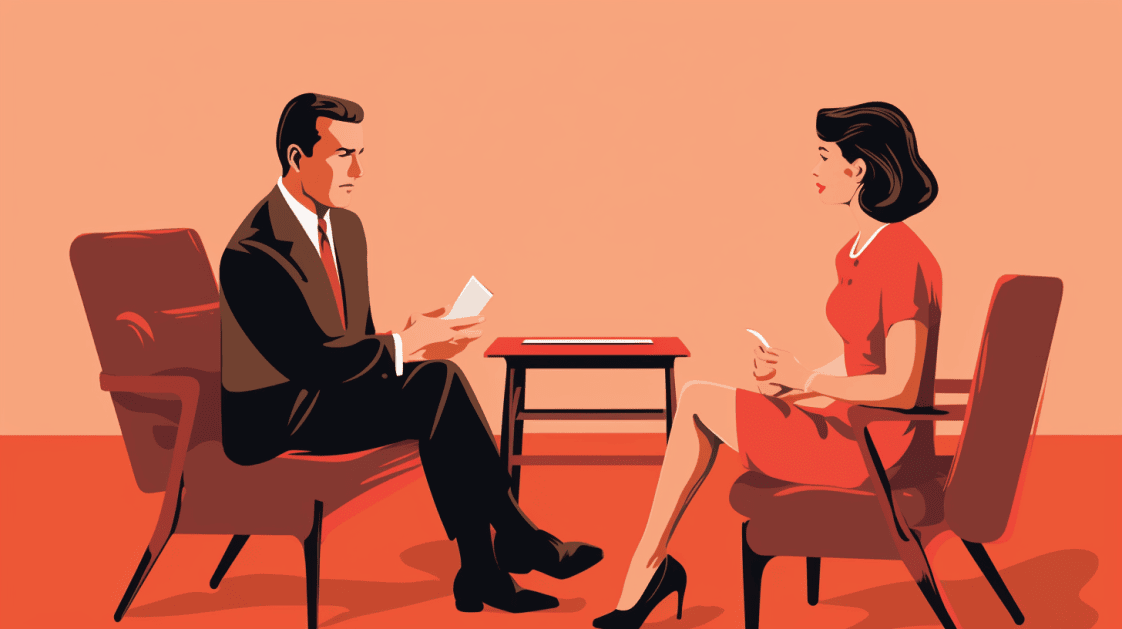
How to Answer “Tell me about yourself” in an Interview
“Could you tell me something about yourself?”
This question at a job interview may seem like an overused icebreaker, but it's actually an opportunity to make an excellent first impression. Solid first impressions can land you a job. So what’s the best way to answer this question and make the most of it?
We’ll break it down and get you ahead of the competition by analyzing the question “Tell me about yourself” and looking at some sample answers.
Why even ask, “Tell me about yourself”?
Most interviewers admit they ask “Tell me about yourself” to buy some time and to get the conversation going. It’s an opener. As soon as you start answering, they can review your resume and see where they’ll go next.
If you see it from their perspective, it’s unsurprising they ask it. Companies like Google receive three million applications a year. Out of the selected pool that makes it to the next stage, there are still countless names, resumes, and achievements to vet and check. Stalling the interview a bit with a well-mannered question is an excellent resource to win those extra seconds and help them remember, “Ah, I now know why we called this one up.” They can’t learn every candidate’s profile by heart.
Comment
byu/fetishthomas69 from discussion
inlearnprogramming
It’s also a way to see how much you’ve prepared. Since HR professionals conduct so many interviews, they’re already experts-in-the-making at detecting if you did your homework. So if you start by mentioning why you’d be an excellent fit for the role with a specific example, which is something candidates many times miss on, they’ll realize quickly you're on track.
Consider this question as an opportunity to cooperate with the HR professional. They’re looking for something, and they’re inviting you to tell them how you can be the person who’ll get them what they need.
What should you answer to the “Tell me about yourself” question?
Every question in an interview could be paraphrased as “Why should we hire you”? This one is no exception.
So your answer should summarise what makes you fit for the job. Tell them what you have worked on, for how long, and what you are interested in.
Don’t repeat your resume like a textbook: They are probably reading it while you speak. However, it is still possible to highlight the particular section of your resume that you believe the interviewer would appreciate. Include anything that might guide you in the direction of the specific role you’re interested in and what you are looking for in your next job.
Telling the interviewer about yourself for a great first impression
These are some essential things to do and to avoid when you tell the interviewer about yourself.
Do your research: Understand their needs and why you're the best fit. Candidates typically focus too much on why they would love the job, but many times they forget to tell their interviewer how they can help. If you get specific examples of where you could make an impact, write them down, so you can hurl them later.
Spark their interest: Say something about yourself that you consider the person on the other end will find interesting. Bonus points if it's somehow relevant to the job you're applying for. They already have your resume, so you should go deeper into details that they wouldn’t have known otherwise. Whatever you tell can be relevant, even if it’s not from the professional field. You could mention casually how you’ve just picked up the guitar again after a couple of months and realized your strings are too stiff. This will lead the interviewer to ask you why, and you could tell how your band broke up. You’re sad about it, but you’re still glad you had an excellent relationship with your former bandmates. That’s a micro-narrative about how you value connections and people told right up front.
Comment
byu/fetishthomas69 from discussion
inlearnprogramming
Practice to turn it into a conversation: You know you’ll be asked this, so practice. Don’t commit the capital sin of anxious candidates and splutter your answer out too fast, too soon. And even if you practice monologues in the mirror, a monologue should be the worst-case scenario (or proof that your interviewer is checking their emails while on the conference call). If you can make it a conversation, then better.
Bring up any mismatches: If you noticed the job description alludes to an in-person position in a different city, yet you’ve been called up for the job, you should mention it. Maybe the job is actually OK with remote workers, and they liked your profile, or possibly, it just slipped by them. It’s in the best interest of both parties to solve any mismatches between what you expect and what they need.
Turn what’s eccentric into something positive: You’ll probably be asked about your greatest weakness, sooner than later. Meanwhile, build a strong case for yourself based on what you have done in your career. If they want the greatest JavaScript full-stack developer out there, you don’t need to convince them you are that one right now — you need to convince them you could become that if they give you the opportunity. So try to use whatever’s unique about you to your advantage and explain why you’re great at growing. If your career is pretty unconventional because you waited tables before becoming a frontend dev, don’t be ashamed or hide it — express it in a way that shows your resilience. Be brief about it, though.
Don’t ramble: Your answer should be neither two sentences long nor last ten minutes. Keep it under one minute, but don’t rush it.
Don’t express anything negative or unnecessary: When answering ”tell me about yourself”, avoid negative talk about your current job or your current situation, as it can signal a bad attitude. Also, don’t get too in-depth, since this is still a first-stage job interview. You can always talk about how you love playing guitar, but refrain from sharing excessive details about your personal life.
Don’t read it: Reading your answer from a .txt file or learning it word by word will make you look stiff. It’s alright — and convenient — to have some notes for your reference, but don’t spout it out as if you were in a poetry slam.
“Tell me about yourself” example answers
The following example follows a job seeker looking for a position as a Junior Software Developer:
The time it takes to say this: one minute, sharp.
What are you doing here?
- You’re telling them something interesting about yourself that you’re betting they’ll find interesting as well
- You’re avoiding any pitfalls regarding your career — so you don’t get the “Wait, you’re a musician and not a developer?” call out down the line
- You’re explaining why you don’t have a full-time job yet
- You’re telling them about relevant experience
- You’re showing how you did your research in terms of what the company is working on; you didn’t just send your resume like a paper plane
- You're asking a question, so you're handing them the reins of the conversation.
Here’s another one from a more experienced developer:
The time it takes to say this: Forty seconds.
What are you doing here?
- You’re telling them what they want to hear: how experienced you are,
- You’re telling them you’re polyvalent and can work on different tech stacks
- You’re hinting at your commitment to education
- You’re telling them what you expect about your career so that you can set expectations
- You’re subtly telling them you like helping people grow professionally, and you can help them with it, meaning you’d be an excellent asset even if you don’t program
Why “Tell me something about yourself” is a very helpful question
Even if the “tell me about yourself” opener is usually associated with a first interview, it will probably show up throughout your career and in very different conversations. That’s why being forced to practice this style of introduction is a good thing.
You will most likely be requested to introduce yourself in business contexts such as meetings and informal social situations, such as a lunch break in a co-working space. It's a good idea to create your own canned “elevator pitch” to present yourself.
Jobseekers also have a say
Jobseekers are right to be exhausted about being asked the same and same questions all over again. It’s safe to claim many jobseekers think the recruitment process needs to be revamped, and fatigue helps explain why ghosting from candidates to HR professionals is on the rise.
But “Tell me something about yourself” is actually a good question to be asked, primarily because it will benefit you, the job seeker. It’s an opportunity to emphasize whichever aspect you think they’ll like about you, and it’s an opportunity to practice a question you’ll be asked in countless situations.
Remember that the interview is a two-way street, and knowing your interviewer's concerns can help you get on track. You can always check company reviews to uncover any unique insights your colleagues believe you should know about, or check job matches so whatever you answer about yourself kindles up your interviewer’s attention.


